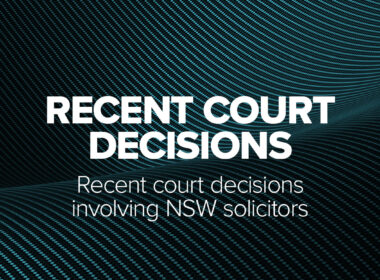In this case, the Plaintiff had brought legal proceedings against three defendants in connection with unpaid mortgages.
The default position in respect of the discontinuation of proceedings by a plaintiff, is that the plaintiff must pay the defendant’s costs of the proceedings: r 42.19 UCPR. The rule gives the Court the discretion: Furnish & Finish Pty Ltd v Hollands [2020] NSWSC 1593 at [30], where the plaintiff can show “some positive ground or good reason”, to make an order otherwise: c.f. Chen v Fang [2019] NSWSC 960 at [53].
Such a good reason may, depending on the circumstance, include “cases where some supervening event or settlement so removes or modifies the subject of the dispute”: at [54]; c.f. Edwards Madigan Torzillo Briggs Pty Ltd v Gloria Stack & Ors [2003] NSWCA 302 at [5]. A supervening event could be sufficient for the Court to deviate from the default position, and for a discontinuance to not be considered a surrender by the plaintiff: Bitannia Pty Ltd v Parkline Constructions Pty Ltd [2009] NSWCA 32 at [79], though it’s worth noting in that case the plaintiff respondent was found not to have shown sufficient reasons.
A supervening event includes:
- the parties having settled the proceedings: Nichols v NFS Agribusiness Pty Ltd [2018] NSWCA 84 at [30];
- some conduct on the part of the defendant that has rendered the proceedings futile: Bitannia at [79]; and
- legislation being amended: Bitannia at [80].
However, there is no decision stating a supervening event is limited to the above circumstances only, and in the decision of Perpetual Corporate Trust Limited v Ip [2024] NSWSC 728 (Perpetual), his Honour Justice Davies determined that there was a sufficient supervening event where actions by a third party resulted in payment of what the plaintiff claimed from the defendant: at [20].
In Perpetual, the Plaintiff had brought legal proceedings against three defendants in connection with unpaid mortgages. This decision related to one of the defendants (the Third Defendant) who was allegedly the guarantor of one of the mortgages. After the commencement of proceedings, the loan claimed against the Third Defendant was paid in full, and the issue was whether the Plaintiff can discontinue proceedings against the Third Defendant without being required to pay their costs.
During the course of the proceedings, the mortgagee had sold the mortgaged property, and the mortgage was subsequently repaid with the proceeds from the sale. Upon the repayment of the mortgage, the Plaintiff sought consent from the Third Defendant for the proceedings to be discontinued with no orders as to costs. The Third Defendant had not responded to the Plaintiff with respect to their discontinuing the proceedings, and “rather surprisingly in the light of what was said” subsequently filed a defence and then sought orders that the Plaintiff pay their costs of the proceedings.
The Third Defendant argued the repayment of the debt, which is the subject of the proceedings, “was not a supervening event as contemplated by the authorities” and that a supervening event is limited to those three circumstances outlined above: c.f. at [17]. Justice Davies, however disagreed with the Third Defendant, and decided “the plaintiff should be entitled to discontinue the proceedings against the third defendant without being required to pay the third defendant’s costs”. His Honour made this finding for two reasons:
- the sale of the mortgaged property which resulted in payment of what the Plaintiff claimed from the Third Defendant was a supervening event; and additionally in obiter suggested the list of a supervening events to be non-exhaustive, stating:
The authorities do not specify the nature of a supervening event. Clearly, a change in legislation, or some act on the part of the defendant which changed the landscape would amount to a supervening event. However, the word “supervene” does not carry with it any connotation of unexpected or unanticipated. Further, the authorities do not qualify “supervening” by any such adjective: [at 20]; and
- following Ward CJ in Eq in Furnish & Finish at [35], that in order for costs orders to be made in favour of one party, where there has been no substantive hearing on the merits of the proceedings, the conduct of the other party needs to have been so unreasonable as to justify such an order: at [22], and his Honour determined the Plaintiff had acted reasonably, specifically more reasonably than the Third Defendant: at [26].
Important takeaways from this decision are, inter alia, that:
- the list of supervening events for the purposes of costs is non-exhaustive; and
- supervening events may include the amount claimed having been paid by a third party.
Matthew Lo is Special Counsel at Kerin Benson Lawyers and a member of the Law Society of NSW’s Costs Committee.




